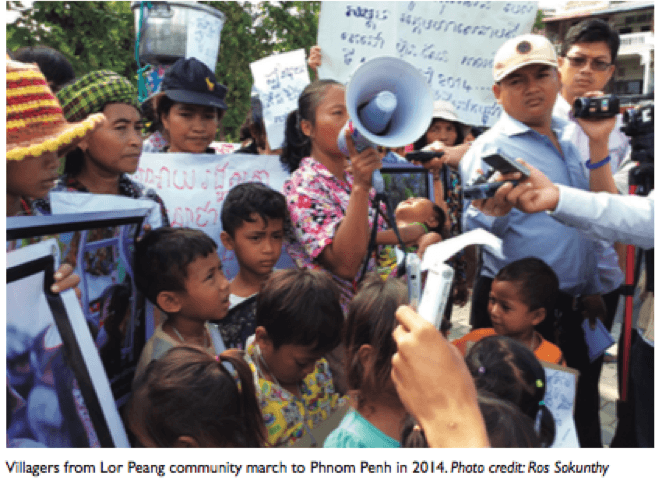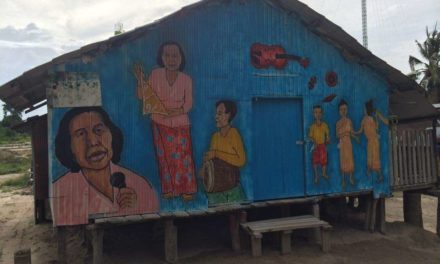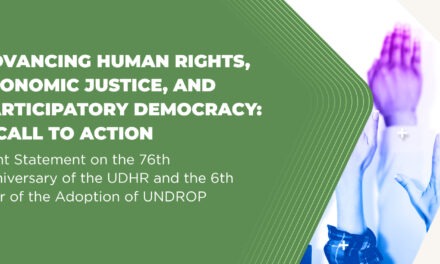By Ros Sokunthy
“Last night I heard the Prime Minister said he never heard about community land conflicts, so I want to send a message to the Prime Minister that my community has a land conflict with the company KDC International. We want the company to stop building the wall; we want the government to order the police out from our village; we want the courts to release the 5 villagers who were arrested; and we want to get a fair and just solution to this land conflict.”
Ms. Um Sophy, resident of Lor Peang village, Kampong Chhnang province, at a press conference at Boeung Kok center in Phnom Penh on 19 August 2014.
“My community is still living on the street next to our land. We hang banners on our tents in front of the land to show we have been living here since long before the land law was issued. Why can’t the court pass the ruling for us to live here?”
Ms. Heng Chenda, resident of Kompenh Chas community, Preah Sihanouk, in personal interview with the author in Kompenh Chason 5 July 2016.
Do Cambodia’s leaders care about the people living in this country? Honestly, I find it hard to say “yes.” Seeing the political situation nowadays I feel hopeless with the leadership. They might say they intend to do something good, but people have observed what they have done to this country and for themselves, and do not believe that they can do good for the country’s peoples.
People are crying everyday in every province because of so-called “sustainable development” as it is destroying community wealth, well being, solidarity, security, significance, livelihoods, land, water, fish and nature, and transferring control over life from local people into the hands of businesses, and rich and powerful individuals and families. To explain why I say this, I will present examples from two communities that have had land conflicts with powerful people and companies since 1996. Twenty years have passed since the conflicts started but the affected families have still not received justice.
The first example is the conflict between Lor Peang community in Kampong Chhnang with KDC International over 196 hectares of farmland. 1 KDC International is owned by Chea Kheng, wife of Minister of Energy and Mining, Suy Sem.The second example is the conflict between Kompenh Chas community in Preah Sihanouk and Thai Bun Rongover 42,710 m square.2 The owner of the company, Thai Bunma who passed away mid June 2016, was well known in the country as a powerful tycoon.
Affected families from both communities sent many petitions and complaints to different government institutions and the courts, but state agencies do not act on complaints against rich and powerful people.When ordinary people file such complaints in the courts, the courts ignore them and delay proceedings. But if a company or politically powerful person registers a complaint against ordinary people, the court will not even investigate the truth. Instead the accused will just be thrown into jail without due legal process and locked up for a long time in order to silence and threaten other community members from conducting actions. Authorities usually arrest men but the struggle does not stop with these arrests.Women take over leadership and continue their advocacy for justice, although they face a lot of criticism that women should stay at home and look after the family, and not engage in such high-risk actions.
This is a culture of impunity: the courts are not independent, fair and unbiased; they usually act and rule in favour of rich and powerful individuals and companies; and cases are not resolved in favour of ordinary people like those in Lor Peang and Kompenh Chas communities. Over the past 20 years local people have not been able to get justice from the judicial system.
The same story is repeated from one community to another: when their lands are seized or threatened by a company or wealthy person, affected people have mobilized, organized and risked their lives to face bulldozers, military police and company security forces. They have used all the government mechanisms and judicial procedures available from local to national levels, seeking fair and timely resolution to the land conflicts. Lor Peang community members walked 30 km from their village to the provincial hall and provincial court in Kampong Chhnang town, and 70 km to Phnom Penh to file complaints and petitions. By walking, they won the attention of many people in Phnom Penh, who recognized the injustice that the community has been facing. But there is no mechanism that can bring real justice for Lor Peang and other community people. Why? Because the company owners are very rich and politically powerful and have high-ranking positions in the government. Judges, prosecutors, police, justice officials and other authorities are not brave enough to conduct real, independent investigations against such powerful people.
In both Kompenh Chas and Lor Peang communities, affected families have land possession certificates, and/or family books and other documents that show how long they have been living on their lands. But these documents are only recognized at the local administrative levels. On the other hand, both the companies were able to acquire ownership titles for the same lands on which local people have been living for a very long time, and these titles were recognized by the courts. Our judicial system and laws do not take into account the realities of peoples’ lives. Instead judgments are based on documents that can be acquired by purchasing, collusion and nepotism.
Most rural people in Cambodia lead hard lives. They work in their fields, share natural resources equally with one another and protect them for future generations. They struggle to defend their rights to land and for social justice. But when they are not able to get justice or when the courts are used against them, people leave their villages or migrate to work in another country, where they face different types of hardships.
After receiving many complaints regarding land conflicts between rural communities and private investors, the government introduced the idea of “social land concessions” (contrasted with “economic land concessions” that private investors get), through which affected families can get land at a different location. By so doing, the government facilitated and helped companies and private investors to get what they want, instead of resolving the conflicts in a fair, just way for local people. However, affected families did not accept these offers because the lands were infertile and poor quality, and very far from their villages.
Economic land concessions and other investment projects supported by the government in the name of economic development have had extremely destructive impacts on peoples’ lives: people were evicted from their lands, their houses were destroyed, they lost many years of livelihood, their families were separated and forced to migrate to escape from threats, violence and judicial harassment and victimization. Rural people want to see local development that does not displace them from their homes and communities. They want real development that allows them to participate using local knowledge, that creates job security for local populations and strengthens local economies. Most of all, people want fair, impartial and honest legal and judicial systems that enable protection of their rights and deliver justice to them instead of allowing the rich and powerful to get away with theft, violence and other crimes.
Footnotes:
1 For information about this case, see: http://www.ohchr.org/EN/HRBodies/HRC/ RegularSessions/Session30/Documents/A_ HRC_30_58_ENG-.docx
2 For information about this case, see: http://cchrcambodia.org/index_old. php?url=project_page/project_page. php&p=land_pro le_detail.php&pro le_ id=19&pro=LR&pro_id=12#









